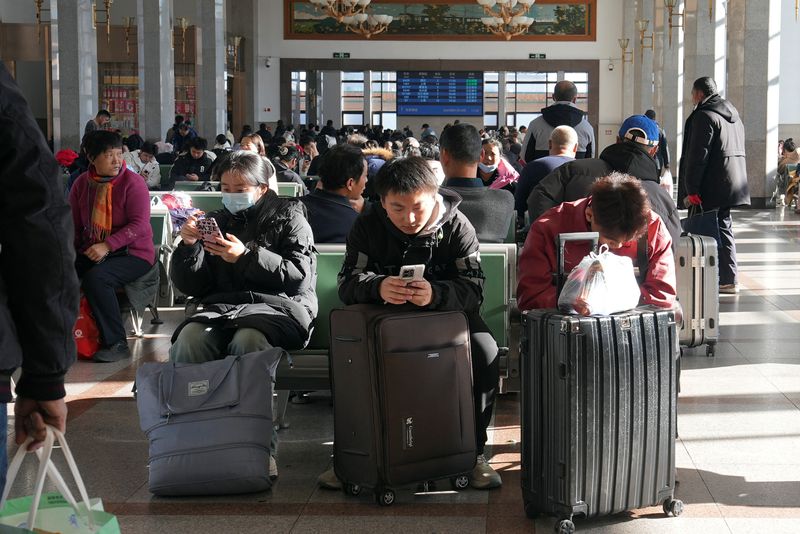Written by Liz Lee
BEIJING (Reuters) – China’s annual Lunar New Year travel blitz officially began on Tuesday, with many taking a mental break from worries about the future to reunite with their families or take a vacation.
The peak travel season in the world’s second-largest economy began with the departure of a train from Beijing minutes after midnight, transporting early travelers from the capital to Hefei in the eastern province of Anhui.
Most people aim to be with their families for the traditional reunion dinner on New Year’s Eve, which falls on January 29 this year.
The 40-day travel season will run until February 22, during which authorities estimate a record 9 billion domestic trips will be made. The forecast matches estimates for 2024, although only 8.4 billion trips were made during last year’s celebrations.
Rail passenger volume is expected to exceed 510 million, while more than 90 million passengers are expected to travel by air. However, the number of trips by private vehicles is expected to reach 7.2 billion, or about 80% of the total domestic passenger flow, the national CCTV network reported.
Most of China’s 1.4 billion people will celebrate the Lunar New Year this year, also known as the Spring Festival, at a time when the economy is struggling to maintain a durable recovery hampered by weak domestic demand and a protracted crisis in the real estate market.
Some travelers said they would not let the state of the economy dampen the sparkle of the upcoming celebrations.
“Despite the slowdown in the economy, I believe that the country as a whole takes into account (the economic situation), and we, as ordinary people, live well (daily),” Wang Zhixiu, 55, said. The old man, who works in property management services, was at the station in Beijing.
“Peace within our country brings us the greatest happiness.”
CCTV said that plane passengers who purchased tickets to multiple destinations during the holiday period rose by 50% compared to last year, and hotel reservations also increased in some provinces.
Beijing, Guangzhou, Harbin, Dali and Fuzhou were popular holiday destinations to make the most of the eight-day public holiday.
But for young people looking for work, the outlook is different.
Shi Zhenyu, 22, was on her way to Harbin for a holiday with friends before traveling to Wuxi in eastern Jiangsu province to celebrate the new year with family. She was hoping the economy would improve so she could join the workforce.
“If the economy improves (in the new year), I will have a better chance of finding a job, and I won’t have to go back to school to get a master’s or doctorate. If the economy improves, my family will improve.” “The father’s remuneration (from work) will not be halved, and everything else is fine,” Xi said.
Youth unemployment reached 18.8% last August, the highest rate since the authorities changed the way they calculated the numbers in December 2023. Although unemployment data has shown some improvement in recent months, millions of university graduates have had to To accept low-paying jobs or even live on their parents’ pensions.
Many have abandoned the pressures of big cities for a simpler life away from the crowds.
For a 33-year-old woman who lives in the northeastern province of Liaoning with her fiancé, the slowing pace of life is a relief.

“Because we’re not in a big city like everyone else, we may not face as much pressure,” said the small business owner, who would only give her last name.
“We also stayed in the big city for a while after graduation and then chose to move back to our hometown where we feel it is friendlier and happier as well,” she said.
https://i-invdn-com.investing.com/news/world_news_3_69x52._800x533_L_1419494235.jpg
Source link